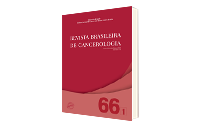Clinical Characteristics and Complications of the Haploidentical Transplantation with Post-Transplant Cyclophosphamide: Implications for Nursing
DOI:
https://doi.org/10.32635/2176-9745.RBC.2020v66n1.361Keywords:
Transplantation, Haploidentical/adverse effects, Cyclophosphamide, Nursing CareAbstract
Introduction: Haploidentical Transplantation (haplo) has been growing in numbers and becoming a viable alternative for patients without compatible donors. Qualified nursing care is also very important for its success. Therefore, it becomes necessary to acquire knowledge and skills about the subject. Objective: To describe clinical characteristics and complications of haplo with post-transplant cyclophosphamide and discuss its implications for nursing care. Method: Integrative literature review published from 2014, searched in the bases of the “Biblioteca Virtual em Saúde” with the descriptor “haploidentical transplantation” and selected with predefined criteria. Results: Twenty-five texts were reviewed, all of them of the medical area and consisting mainly of retrospective cohort studies with small samples. Among the most prevalent characteristics, the following were outstanding: the mother as the main donor for children (5/7 studies); non-myeloablative regimen (52%) and peripheral blood graft (56%). In addition to graft versus host disease and rejection, the most described complications were: BK virus hemorrhagic cystitis (56%) and reactivation of cytomegalovirus (48%); and the ones with the highest variations in frequencies were mucositis (8% to 100%) and noninfectious fever (22% to 100%). The main causes of mortality were relapse of the disease (3% to 35%) and infections (3% to 32%). Conclusion: This review warned about the necessity of improving the care in the administration of post-cyclophosphamide, the support to donors and management of noninfectious fever, viral infections and hemorrhagic cystitis to improve the quality of life of patients and reduce haplo-related morbidity and mortality.









